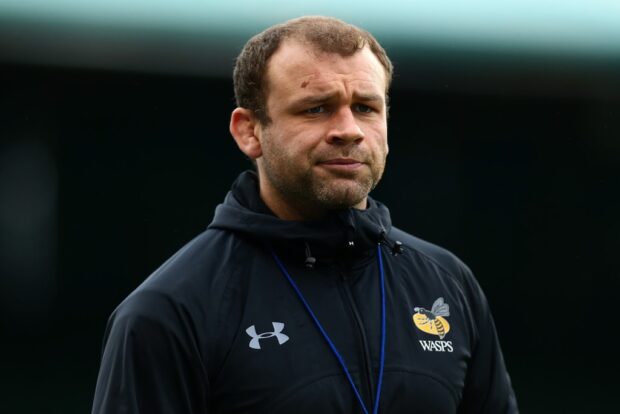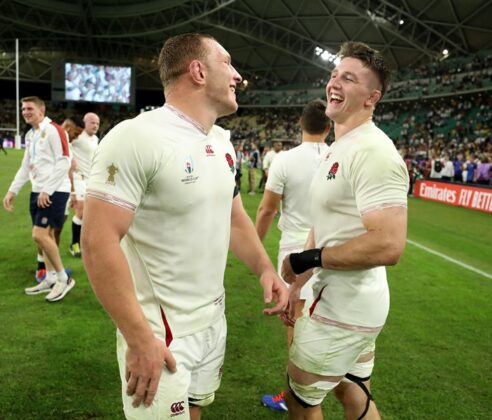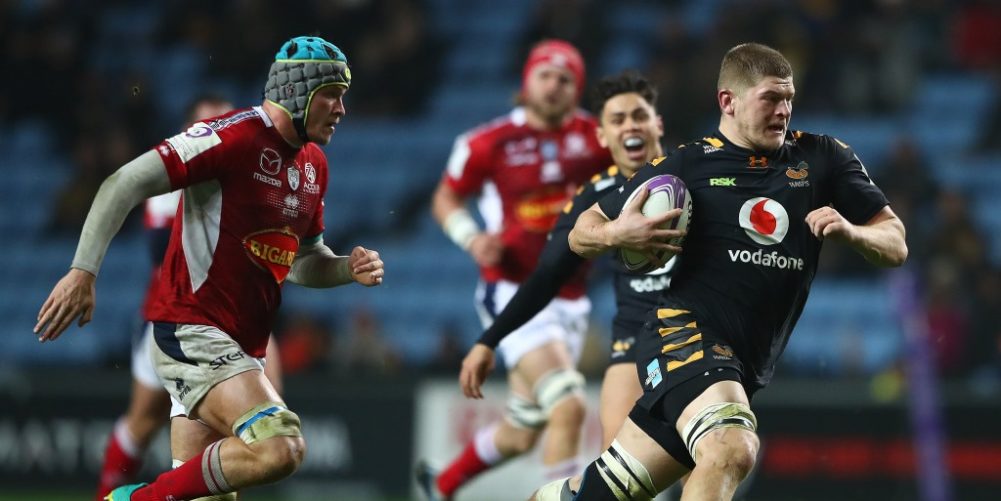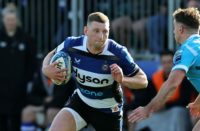MEET Jack Willis, the turnover king of England. The 23-year-old Wasps flanker has no rivals when it comes to winning the ball at the breakdown, and that includes outstripping England's dynamic openside duo of Tom Curry and Sam Underhill.
Willis had already amassed a remarkable 28 turnovers in only 11 Premiership games before lockdown was introduced, leaving his nearest rivals, London Irish flanker Blair Cowan (15), and his Saracens counterpart, Ben Earl (12) in his slipstream.
To offer a comparison, when Willis was recovering from a knee reconstruction last season after an ACL injury sustained in the Wasps 2018 Premiership semi-final loss to Saracens, it was Curry who topped the turnovers with 22 in 13 league matches.
Willis making almost double the number of steals this season than the next best breakdown burglar almost jumps off the page, and it is matched by the quality of the match-winning ball he delivers, whether in defence or attack.
What it does not reveal is that he has to run a gauntlet of hurtling human missiles, most of them heavyweight forwards capable of breaking bones and rupturing ligaments, who he must deflect, bump-off, or evade to get his hands on the breakdown gold.
The reason turn-over ball is so precious – and why it is defended in the breakdown danger zone as if life depended on it – is because it dislocates defences.
If an attacking side lose the ball after applying sustained pressure they are suddenly very vulnerable. The have players out of position, and when Willis and his ilk nick the ball, they are exposed.
This often results in the team that was attacking being skewered by a lethal counter-attack – and it is here that Willis has played a crucial role in a Wasps pre-lockdown resurgence which took them from the basement of the league after a poor start, to within reach of a play-off place.
Willis is gold standard in another very important sense, in terms of introducing unpredictability into the match arena.
Certainty of possession in any area of a sport which is based on a contest for the ball, like Rugby Union, makes it as dull as ditchwater. That is why, by injecting unpredictably of outcome, flankers like Willis light up the game for spectators.
However, the idea that the 6ft 3ins, 17st 5lbs/110kg Willis is a one-trick act is contradicted by the evidence on offer. This season the mobile Reading born-and-bred flanker has proved to be an all-round menace.
Willis is a strong momentum-generating carrier who stays on his feet and challenges the defensive line. His eight tries are a high return for a flanker, and go from short range to long, including an interception from his own half against Gloucester, where he had the pace to hold off their backline chasers.
Willis says a lockdown regime at his Leamington Spa home of a morning weights work-out followed by a fitness/running session on the nearby fields at Old Leamingtonians has kept him in shape, and that the break from full-on contact has had its benefits – and drawbacks.
“The body is feeling quite fresh for once – but you know it's going to be even worse when you come back. After the first couple of games you can barely walk, but even so I've been itching to get back. It takes about six games to get used to the contact again.”
He adds: “The best form of training for match conditions is playing matches – but you can get pretty close in opposed training sessions. However, while you can replicate the physical fatigue, you cannot replicate the level of mental fatigue, because of the intense focus required.”
Focus seems to have been an ever-present Willis trait judging by this anecdote about his mini-rugby days at Abbey RFC in Reading, where his father, Steve, was a back row stalwart.
“I started at age eight, and by that time me and my brother Tom, who is now a No.8 with Wasps, were causing carnage tackling each other in our garden. We were taken to tag rugby when I was seven, but when we started tackling the other kids it didn't go down too well, so we waited another year.
“Tom is two years younger than me but he grew a lot more quickly, so when I was 14 and he was 12 we were very similar sizes. Now he's an inch taller at 6ft 4ins – and an inch taller than that in his high heels!”
Willis says he owes a great deal to his enrollment in the Henley College AASE programme. “The rugby coach there, Danny Batty, was really important to me. In fact, the whole AASE input was great because it helped me get into the Wasps Academy, even though the traditional route is through private schools – and my family was not able to do that.
“First the academy was in Ealing, and then it moved to Coventry, where I was in a house with Will Stuart – who has just been called up by England – and Owain James. Will spent all his time after training sleeping. We even found him asleep on the landing once because he was so tired he couldn't make it to the bed.”
Given the rigours of the training regime Willis has submitted himself to in order to become a breakdown maestro there is every likelihood he is as familiar with kipping on landings as his old house-mate.
“I put so much time into winning turnovers because you need something as a player to make you stand out. It's about learning to be smart, and seeing the big picture.
“I work very hard on jackalling, and analysing when to fire into the breakdown, and when to stay out. I also look at the opportunities to win turnovers off kick-chase, and around the rucks wide out where, if you get quick ball, you have a great chance of scoring.”
Willis says that Matt Everard, the gritty former Wasps, Leicester and Nottingham openside, who is now part of the Wasps coaching team, has played a big part in honing his technique. “He's been great in helping me with detailed training and skills, and in a training week we spend at least five hours extra doing bits and bobs.
“Matt is very good on the specifics of technique and timing at the breakdown. We work on different scenarios, especially angles of clear-out, and how to counteract them. My flexibility helps a lot, because it gives me time to cling on.”

Willis may have had a relatively short pro career, but when it comes to dealing with injuries he is veteran. These include a right ankle operation at 18, followed by two operations to a stress fracture in his left ankle.
Then came the knee surgery in 2018 to repair both cruciate ligaments sustained trying to pilfer ball against Saracens only days after Willis had been selected in the England squad to tour South Africa.
The Wasps flanker recalls: “I was gutted. Being invited on the tour was one of the best moments of my life, and it felt like my career had come crashing down. But you just have to readjust and commit to getting back.”
These experiences explain why Willis places such a high premium on flexibility. “It's massive. It can get you out of some very difficult, awkward positions when the heavy clear-outs come in. I've always had good flexibility, and have developed my own stretching routines. In the mornings I do 20 minutes, and in the evening I do another hour. I've also started yoga with my missus – and that's outside the times when I'm on the sofa randomly stretching out.
“I have had a torrid time with injuries and the stretching is all about injury prevention. It may sound harsh, but we are paid to play rugby, and as an injured player you are not doing the job – and it's well documented that being on the outside doing recovery work is not a great place to be.”
Ask Willis if there are any law or refereeing changes needed at the breakdown, and he sounds like an old head on young shoulders.
“It's incredibly tough to be a referee, and I don't think I could do it. They can never win, but they do a fantastic job. However, there are a couple of law changes that might improve the chaos at the breakdown.
“Clear-outs are not picked up enough when they come in from the side, and full-speed off-your-feet shoulder charges aimed at players challenging for the ball should be penalised or carded. They are often deliberate and cause injuries – and should come under dangerous play.”
It is no surprise when Willis shows admiration for those flankers whose commitment is unwavering.
“Richie McCaw is someone I would have loved to play against. He was so physical, and put his body on the line, but also so consistent and effective. I hope I can play that way. I have great respect for my Wasps back row team-mate Thomas Young on a day-to-day basis. You can't fault his commitment and there are parts of his game I can only dream of having, because he is so incredibly quick and skilful.
“I always admired the way my dad played for Abbey RFC when I watched him as a youngster. Teams always seemed to target him, and there were no cameras, and lots of dirty tricks in those days – yet, he always carried and tackled with such heart.”

Willis is also generous in his praise of Curry and Underhill, two rivals who have been capped by England ahead of him.
He says of their 2019 World Cup contribution in helping England to the final: “Tom is a year younger than me and Sam a year older, and it was great to see young players making such an impression. Underhill's physicality in defence was fantastic, and Curry's ability over the ball and skill was the same. England blitzed New Zealand off the park.”
However, since he became England head coach Eddie Jones has said repeatedly that the door is never shut to X-Factor players who can swing games in the blink of an eye. Jones lists the great Australian poacher George Smith as one of those, and, as he worked with Willis at Wasps, it is probably why he wanted to have a closer look at Jack two years ago in South Africa.
Injury intervened, and the England opportunity went begging. Jack Willis says his focus is on Wasps, but that he hopes to get another chance – and he is doing everything he can to ensure that his X-Factor turnover technique does his talking for him.



























